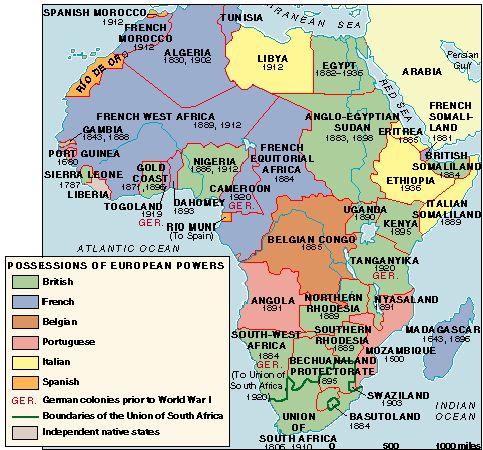The second world war of 1939-1945 was a result of the German Chancellor, Adolf Hitler’s plans to take control of Europe. Hitler also wanted to regain territories in Africa lost as a result of Treaty of Versailles of 1919. On other hand, Mussolini the Italian dictator occupied Ethiopia in 1935 until he was forced out in 1941. Africans participated in World War II as combatants and labourers. This war affected Africa in different ways.
The first major result of World War II for Africa was the end of colonialism. Britain and France were replaced as world powers by Russia and USA. They had an anti-colonial tradition and encouraged colonial powers to decolonize. The new super powers dominated the United Nations and put pressure on colonial powers to prepare Africans for self-government. The emergence of Russia as a world power also led to the spread of socialist and Marxist ideas especially in French colonies.
Post war Asia also contributed to the rapid decolonization of Africa. In World War II the Japanese overrun South-East Asia, pushing the British out of Hong Kong, Malaya, Burma. The Dutch were defeated in Indonesia. The fall of Singapore marked the worst defeat in British history. The French were defeated in Vietnam. Some Africans had fought on the side of the French in Vietnam, for example, Ben Bella, leader of Algerian revolution and Jean Bedel Bokassa, later president of Central African Republic. The defeat of the white men by yellow people encouraged black people to begin on a struggle that would mark the decolonization of Africa.
The independence of India and Pakistan in1947 and Mahatma Gandhi’s strategy of achieving independence after World War II encouraged Africans to struggle for self determination. In particular, Gandhi’s method of non-violence was adopted by Kwame Nkrumah and other African nationalists. This led to the achievement of self determination of African colonies in a few years.
Another effect was the growth of Pan-Africanism. The Pan-African movement started at the end of ther 19th C to promote the interests of black people both in Africa and the Diaspora. The attack of Italy on Ethiopia in 1935 and the defeat of Italy in 1941 served to unite black people in Africa and the rest of the world against colonial rule. It encouraged the growth of black nationalism, leading to the convening of the 5th Pan-African Congress which was held at Manchester in 1945. The solution of the congress to push for the immediate end of colonialism in Africa resulted in the formation of mass political parties. As a result most African countries achieved their independence between 1960 and 1970.
The war also resulted in the formation of the UN which in turn affected events in Africa. In 1941 American president Franklin Roosevelt and British Prime Minister Winston Churchill signed the Atlantic Charter which called for self determination of all peoples. This idea was adopted by United Nations Charter of 1945 which also called for independence and improvement of livelihoods colonized peoples. The development of human rights system which began in 1948 with the signing of the Universal Declaration of Human Rights has led to the improvement of livelihoods in Africa through the promotion human rights, for example for children and women. In addition, the United Nations Trusteeship council put pressure on colonial powers to grant independence to African states. The formation of the UN also encouraged the growth of African nationalism which in turn led to the rapid decolonization of Africa.
The Second World War economically affected Africa in many ways. During the war the needs of European powers led to economic expansion in Africa. This led to expansion on the growth of cash crops and small scale industry, for example, the supply of groundnut oil from Senegal. There was also expansion in mining because of the need for different minerals by the European powers. In Kenya Africans were allowed to grow crops.It was previously not allowed to grow, for example tea and coffee.
War time industrialization led to greater expectations for Africans as Africans demanded for industrialization in their countries. There was inflation as a result of high prices for imports and low ones for exports. This affected living conditions of Africans.
As a result of the war, more jobs were created especially in French West Africa. This in turn caused migration of large numbers of people to cities.However as the numbers of migrants increased there was unemployment. Africans especially produce rubber and other goods. The economic hardships in turn caused discontent and led to the rise of African nationalism.
The post war period marked increased exploitation of Africa by the colonial powers. There was increased dependence of Africa on the western world. This was because of emphasis on the production of cash crops. Cash crops were exported a low prices as compared to imports while industrialization was discouraged. The post war period also marked increased destruction of African culture as a result of colonial education.
Source: myelimu.com
For information about the contribution of










